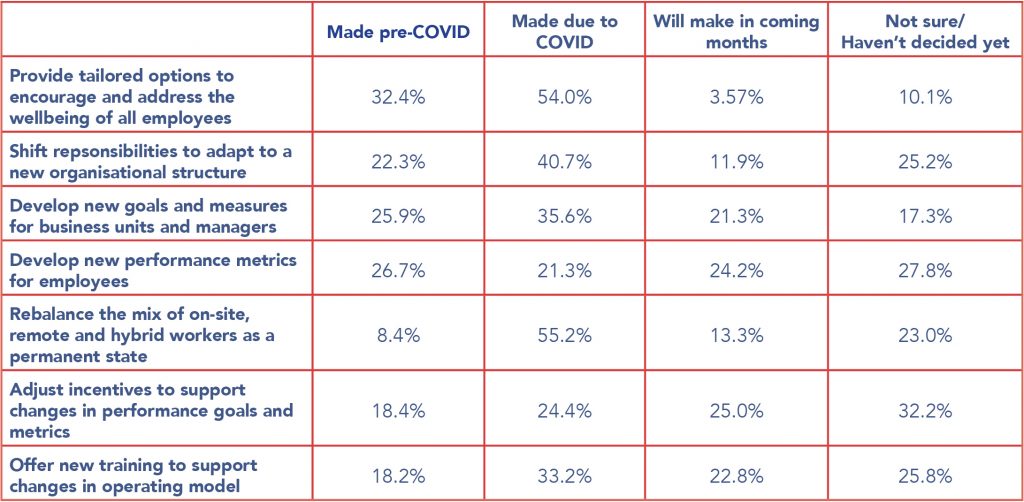The world is now standing at the crossroads.
At this critical juncture, we are faced with two choices – to transform or perish. As the Greek Philosopher, Heraclitus, once said, “change is the only constant”. 2020 was a stark reminder that we must learn to adapt or risk being eroded by time. The same holds true for our profession. It is thus imperative that we re-examine our capabilities and skillsets, and reinvent ourselves for the future challenges that await. The adoption of a growth mindset is key to successfully navigating this world of flux.
The Road Ahead
The onset of COVID-19 has brought about many changes to the world of work, with the most significant being the rapid acceleration of digitalisation and remote working as companies were forced to adjust to the “new normal” way of operating their businesses. The era of big data and tech is now right on our doorstep, soon to be ushered in by the digital natives – those in Gen Z that were born between 1997-2010 and who grew up around digital technology – as they enter the workforce. In the years to come, digital technologies will become more firmly embedded within our work and the new decade will be defined by the use of digital tools and systems and predictive data analytics. For older workers this means that upskilling and reskilling is on the agenda to enable them to stay relevant amidst the changing work landscape. This is especially true given that Singapore is predominantly a knowledge-based economy.
rapid acceleration of digitalisation and remote working as companies were forced to adjust to the “new normal” way of operating their businesses. The era of big data and tech is now right on our doorstep, soon to be ushered in by the digital natives – those in Gen Z that were born between 1997-2010 and who grew up around digital technology – as they enter the workforce. In the years to come, digital technologies will become more firmly embedded within our work and the new decade will be defined by the use of digital tools and systems and predictive data analytics. For older workers this means that upskilling and reskilling is on the agenda to enable them to stay relevant amidst the changing work landscape. This is especially true given that Singapore is predominantly a knowledge-based economy.
A second major phenomenon that has been hastened by COVID-19 is the upsurgence of the gig economy. Broadly defined, the gig economy encompasses a wide spectrum of workers and pay scales, ranging from highly skilled mobile professionals to full-time independent contractors (such as freelancers and consultants) and workers belonging to the informal economy (such as ride-hailing Grab drivers and food delivery drivers). To put it simply, gig workers are contracted to work in short-term, temporary assignments for one or a variety of employers. There are two major factors driving the popularisation of the gig economy. On the one hand, many workers who have been faced with salary cuts, temporary layoffs and retrenchments as a result of the pandemic crisis have turned to gig work in the interim for primary or supplemental income. On the other hand, gig jobs are more appealing to employers than ever due to the cost-savings and greater flexibility that it offers in comparison to hiring a permanent employee. In these unprecedented times, the ability to afford permanent talent has become a luxury for businesses affected by COVID-19, especially small and medium enterprises (SMEs). Freelancers fill the gap by providing much-needed expertise to companies without requiring any long-term commitment.
Traditionally, the bulk of the gig economy has been made up of workers in the informal sector whereas knowledge workers such as engineers, consultants and management executives remain largely untouched by it. This is mainly attributed to organisational resistance due to the perceived threat gig work presents to building a cohesive organisational culture and concerns regarding effective cooperation and worker productivity. These are the same organisational barriers that are inhibiting companies from adopting remote work for full-time employees. However, with remote working becoming normalised in the workplace as a result of COVID-19, we may at last witness the gigification of white-collar jobs and a transformation in the mainstream approach to work.
Gearing Up for The Future
Old habits die hard, thus do people and organisations fear and resist change. Nevertheless, there needs to be a paradigm shift in the way we approach it. Change is inevitable. By embracing, anticipating and actively taking steps to address it, we would be able to pivot quickly when change finally arrives. As Benjamin Franklin has so aptly put it, “if you fail to plan, you plan to fail” –
anticipating and actively taking steps to address it, we would be able to pivot quickly when change finally arrives. As Benjamin Franklin has so aptly put it, “if you fail to plan, you plan to fail” –
COVID-19 epitomises this. The repercussions of 2020 are deep. The world has witnessed firsthand how unpreparedness resulted in policy failure. Years of human development progress vanished overnight as unemployment numbers skyrocketed and millions are pushed back into poverty. Even now, the world economy teeters on the brink of recession. The lesson from this is clear – strategic foresight and change leadership are of the essence.
The future of work calls for agility and flexibility. For individuals, this means that breadth of knowledge will become as important – if not more so – than deep expertise. The old adage that “a jack of all trades is a master of none, but often times better than a master of one” holds true even in contemporary times. It is the generalist, not the specialist, who will be better poised to adapt to the workplace of the future. Essentially, the generalist is an individual who is able to draw on complex bodies of knowledge to solve specific problems. This multidisciplinary approach to problem-solving is critical because in today’s globalised economy, it has become a commonplace for developments in a particular area to create ripple effects in a seemingly unrelated field. Already, the call for generalists is reflected in a world economic forum survey which reports that the skills most desired by leading global employers are:
1) analytical thinking and innovation,
2) active learning and learning strategies,
3) creativity, originality and initiative,
4) technology design and programming,
5) critical thinking and analysis, and
6) complex problem-solving.
According to Lisa Stern Hayes, one of Google’s top recruiters, the company prizes problem solvers who possess a general cognitive ability over role-related knowledge. This is relevant because with digitalisation and technological advancements, old roles are constantly being made redundant even as new ones emerge. With how quickly change occurs, companies need to be assured that they will be able to redeploy the person they hire to other functions, hence the need to recruit an individual with a versatile skill set.

Building the Foundation
The key to a successful transformation lies in having a strong organisational foundation. For businesses, this means developing a good human capital strategy to steer the organisation and ensure that everyone is keeping pace with change. Fronting the agenda is job redesign – the process of rethinking tasks and responsibilities to better align roles with the changing environment, both internally and externally. With digitalisation and Industry 4.0 innovations improving productivity and redefining how organisations derive and deliver value, there is a need to evaluate which roles will be eliminated and cross-train employees so as to reduce redundancy. HR will also need to analyse how digital technologies affect job tasks, eliminate inefficiencies and help employees – especially older ones – adjust to a digital workplace culture. Now more than ever, it is essential for businesses to conduct a learning needs assessment. In a recent joint poll conducted between Segal—a leading global HR and management consulting firm—and Chief Executive Group, it was revealed that many of the changes implemented in 2020 by businesses to support workers and operations were reactionary.

With the lessons gleaned from 2020, business leaders and HR will need to proactively consider howthey can revamp the way they conduct business and place the company in a stronger position to compete in a changing world. Embracing diversity and inclusion strategies is one area to be looked into. Businesses and HR leaders should also survey how to effectively manage and engage gig workers. As highlighted earlier, the gig model will undoubtedly expand in the future and with it, there will be a corresponding shift in the way benefits of employment are meted out. Business leaders and policymakers must come together to create a permanent social safety net for gig workers to ensure the long-term viability and sustainability of the gig economy – for example, extending vital workplace benefits such as paid sick leave to gig workers and giving them greater collective bargaining rights. The journey through change will be long – it is crucial for people and organisations to pace the change and understand not only their destination, but also be intimately aware of their own starting point. More importantly, have courage, let innovation and creativity reign. As Tom Althouse once said, “fear not the unknown, for it is a sea of possibilities.”
Some Useful Resources
Here are some of the SHRI Transformational and Digitalisation Programmes which may be of interest to you
• Building a People Analytics Strategy
• Delivering Transformational Change
• Digital HR Strategy
• Emerging Technologies for Excellent Human Resource Service Delivery & Operational Excellence
• Human Resource Analytics and Insights
• Workforce Planning Essentials
The 15th Singapore HR Awards
In recognising and celebrating HR’s effort, agility and resilience in 2020 amidst the pandemic, we also look forward to your participation at The 15th Singapore HR Awards
Bibliography
• Hermann, I. and Paris, C.M., “Digital Nomadism: the nexus of remote working and travel mobility”, Information Technology & Tourism 22, no. 1 (2020): 329–334, https://doi.org/10.1007/s40558-020-00188-w
• Karianne Gomez, Tiffany Mawhinney and Kimberly Betts, “Welcome to Gen Z,” Deloitte, May 2019,
https://www2.deloitte.com/content/dam/Deloitte/us/Documents/consumer-business/welcome-to-gen-https://link.springer.com/article/10.1007%2Fs40558-020-00188-wz.pdf
• Olivier Meier, “Two Minutes to Understand and Prepare for the Rise of Expatriate Gig Workers,” Mercer, October 12, 2020,
https://mobilityexchange.mercer.com/insights/article/two-minutes-to-understand-and-prepare-for-the-rise-of-expatriate-gig-workers
• John Frazer, “How The Gig Economy Is Reshaping Careers For The Next Generation,” Forbes, February 15, 2019,
https://www.forbes.com/sites/johnfrazer1/2019/02/15/how-the-gig-economy-is-reshaping-careers-for-the-next-generation/?sh=302eb3c649ad
• Rebecca Henderson, “How COVID-19 Has Transformed The Gig Economy,” Forbes, December 10, 2020,
https://www.forbes.com/sites/rebeccahenderson/2020/12/10/how-covid-19-has-transformed-the-gig-economy/?sh=30518c4f6c99
• Lanna Deamer, “How the Gig Economy Can Save The UK SMEs Post-COVID-19,” Startups Magazine, September 2020,
https://startupsmagazine.co.uk/article-how-gig-economy-can-save-uk-smes-post-covid-19
• Sameer Hasija, V. “Paddy” Padmanabhan and Prashant Rampal, “Will the Pandemic Push Knowledge Work into the Gig Economy?,” Forbes, June 1,
2020, https://hbr.org/2020/06/will-the-pandemic-push-knowledge-work-into-the-gig-economy
• Paul Blake and Divyanshi Wadhwa, “2020 Year in Review: The impact of COVID-19 in 12 charts,” World Bank, December 14, 2020,
https://blogs.worldbank.org/voices/2020-year-review-impact-covid-19-12-charts
• Vikram Mansharamani, “Harvard lecturer: ‘No specific skill will get you ahead in the future’—but this ‘way of thinking’ will,” CNBC, June 15, 2020,
https://www.cnbc.com/2020/06/15/harvard-yale-researcher-future-success-is-not-a-specific-skill-its-a-type-of-thinking.html
• Vikram Mansharamani, “All Hail the Generalist,” Harvard Business Review, June 4, 2012, https://hbr.org/2012/06/all-hail-the-generalist
• World Economic Forum, The Future of Jobs Report (Geneva: World Economic Forum, 2018), 12.
• Ruth Umoh, “Top Google recruiter: The most important skill you should have to score a position at the company,” CNBC, November 28, 2017,
https://www.cnbc.com/2017/11/28/the-most-important-skill-you-should-have-to-score-a-job-at-google.html
• Fred Hencke, “Hindsight 2020: CEO Poll Reveals Key Lessons For The Future,” Chief Executive, January 19, 2021,
https://chiefexecutive.net/hindsight-2020-ceo-poll-reveals-key-lesson







